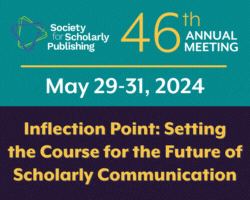Jeffrey Mervis, senior correspondent for Science magazine will deliver the first keynote presentation at the Society for Scholarly Publishing (SSP)’s 39th Annual Meeting on Thursday, June 1 in Boston. Mervis is a journalist focused on the intersection of science and government policy.
Ahead of the Annual Meeting, Mervis was kind enough to sit down with us for a quick interview on what attendees can expect from his presentation.
Can you share a bit about your career journey and experience with scholarly publishing?
Mervis: I am by training a journalist, meaning that I got my experience on the job. I began with small newspapers, moved up to daily newspapers. Then I got into science journalism about 35 years ago and have been with a series of scientific publications and societies, starting with the American Psychological Association and The Scientist, which I joined as a founding news editor, and then on to Nature magazine, before I came to Science in 1993, which of course is published by AAAS.
Can you give us a quick description of what you plan to talk about during your keynote?
I’m going to be looking at the first four months of the administration of President Trump, and trying to parse what the key issues are for the scientific community. That means addressing what President Trump and his administration have done so far, including some rumors and myths about what they haven’t done, and then, to the extent possible, look at what these first few months tell us about what might come next. It’s always a danger to look too far ahead when talking about politics in Washington, so I’m going to try to stick to the facts. Obviously, this is a topic that is constantly in flux, but I’m hoping there will be enough of a calm before the next storm so that I’ll be able to make some general comments.
What role do you think scholarly publishing plays in today’s political and scientific climate?
I think it has an important role. It’s sort of a cliché to say “more important than ever,” but I think you can make a case that the ability of the scientific community to continue to function in a way that promotes transparency and openness and reproducibility has never been more important. I think those are issues that are going to be part of the public debate, both within the White House and in Congress, and I think the scientific and scientific publishing communities are going to find themselves participating in those discussions, whether they like it or not.
Do you foresee any big challenges that scholarly publishing or science will face being a part of those discussions?
The issue of reproducibility writ large is going to affect scientific publishing to a considerable extent. I think that policy makers don’t really understand the process by which research gets turned into knowledge that is disseminated to the public. That’s one issue. Another issue is, “How come the study that came out this week contradicts the study that came out last month? What’s going on here? Are we wasting taxpayer dollars? Is someone trying to pull the wool over our eyes? Does science have an agenda?” Those questions come up when legislators and policy makers don’t really understand the scientific process and the process of publishing results.
What do you hope that attendees take away from your keynote?
I hope they will have a little better understanding of what goes on in government. I try to provide information that will help people understand why an administration, why Congress, why an agency did what it just did, and how that might affect them. I hope that people will feel that they understand this relationship a little better than they did before.
What makes you excited to address the SSP attendees?
The fact that attendees are interested in hearing me talk about science policy is heartening, because I think it’s important. I also think it’s fun! I’ve done it for a long time and I enjoy it and I enjoy sharing what I’ve learned with a broader audience like yours.



Join the Conversation
You must be logged in to post a comment.